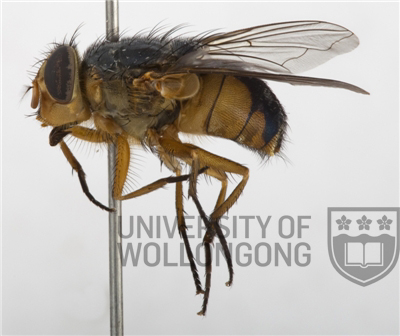Taxonomy
Family: Calliphoridae
Subfamily: Calliphorinae
Genus: Calliphora Robineau-Desvoidy 1830
Subgenus: Paracalliphora Townsend 1916
Species: centralis Malloch 1927
The immature stages are unknown.
Biology
Calliphora centralis is undoubtedly attracted to carrion, however, it has not been observed breeding in this medium. It is however believed to be a carrion-breeder, as females carry relatively large first-instar larvae like other known carrion-breeders of the subgenus Paracalliphora (Wallman 2001).
It is an open forest species, often confined to timbered plain country (Hardy 1932; Hardy 1937). Early authors suggested that C. centralis is not attracted to carrion and is difficult to capture with traps. The present authors have captured this species using carrion as bait.
Distribution
Calliphora centralis occurs throughout coastal New South Wales north of Sydney, extending into southern Queensland (Hardy 1937).
Relevant Literature
Hardy, G.H. (1932) Some Australian species
of Calliphora
(subgenera Neopollenia
and Proekon).
Bulletin of
Entomological Research 23,
549-558.
Hardy, G.H. (1937) Notes on the genus
Calliphora (Diptera).
Proceedings of the
Linnean Society of New South Wales 62, 17-26.
Wallman, J.F. (2001) A key to the adults of species
of blowflies in southern Australia known or suspected to
breed in carrion. Medical and
Veterinary Entomology 15,
433-437.
Wallman, J.F., Leys, R. and Hogendoorn, K. (2005) Molecular systematics of Australian carrion-breeding blowflies (Diptera: Calliphoridae) based on mitochondrial DNA. Invertebrate Systematics 19, 1-15.


